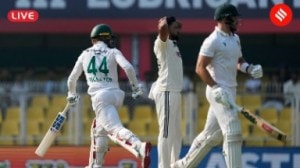US refuses visa to ex-IISc chief, member of PM panel
Questioning his internationally acclaimed credentials and suggesting that he was working in “chemical warfare and bioterrorism,” t...

Questioning his internationally acclaimed credentials and suggesting that he was working in “chemical warfare and bioterrorism,” the United States has refused an entry visa to Professor Goverdhan Mehta, former director of the Indian Institute of Science, Bangalore, and one of the world’s top scientists in organic chemistry.
This despite the fact that Mehta, a member of Prime Minister Manmohan Singh’s Scientific Advisory Committee, has been to the US 20 times, the most recent being May 2005 when he delivered a lecture at the National Academy of Sciences in Washington, DC.
And in 2004, when he participated in the Indo-US S&T Forum Governing body meeting under the aegis of the White House.
“This is the most degrading experience of my life,” Mehta told The Indian Express, “it’s reminiscent of the (current) American ignorance and arrogance.” Mehta has informed the university declining its invitation.
Mehta applied for the visa in Chennai after he was invited as a visiting professor by the University of Florida at Gainesville, and for a lecture at the American Chemical Society.
On February 9, Mehta appeared for the visa interview. He said he was “repeatedly humiliated” by the consular officer who accused him of “hiding things” suggesting that Mehta’s work related to chemical warfare and bioterrorism.
|
Look who’s a threat
to the US |
||
|
• A Fulbright scholar, Mehta is member of the governing board of Indo-US Science and Technology Forum |
||
Confirming that Mehta was turned away without grant of a visa, David Kennedy, spokesman for the US Embassy in New Delhi, said it was a “pretty standard affair to ask for more information.”
Mehta said he told US officials that all his academic research was in the public domain and related to “new molecular entities” and “by no stretch of imagination (could be) related to chemical warfare.”
“At one point he (the consular officer) even asked me about my PhD research carried out 40 years ago. I tried to plead that I have been invited by a university as visiting professor.”
“Distressed” over the treatment meted out to one India’s top scientists, R A Mashelkar, president of the Indian National Science Academy (INSA), said this was a “very unfortunate” incident.
Ironically, the Paris-based International Council of Science, of which Mehta is the president, is a global organisation committed to the rights of the free movement of scientists. It’s the oldest and largest federation of science academies with over 100 national academies including the US Academy as its members.
Earlier before taking over as president of ICSU, in a 2004 piece in Science magazine, Mehta had written: “All scientists should have the possibility of participating without discrimination.”



- 01
- 02
- 03
- 04
- 05




























